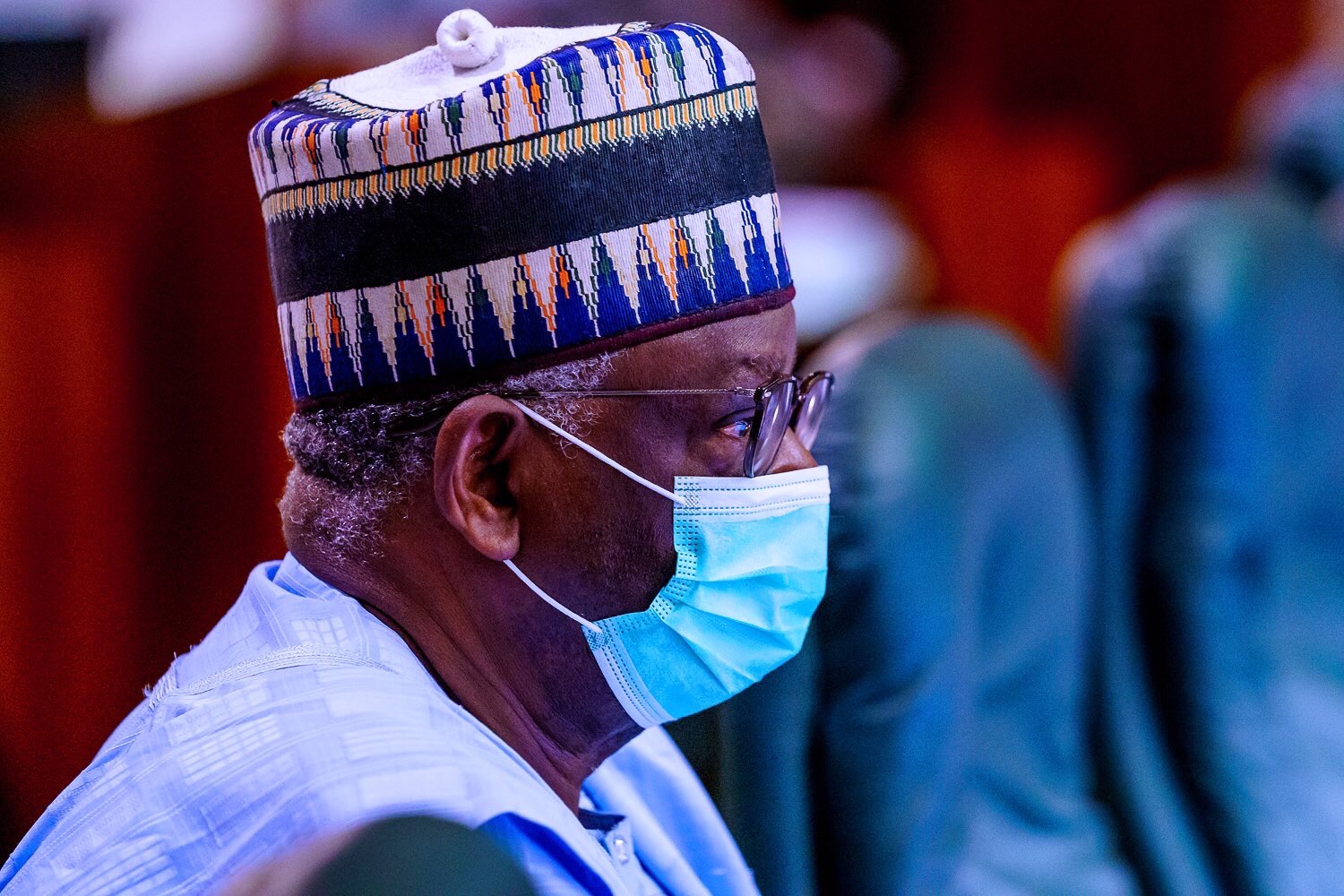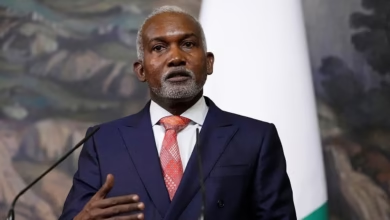
By Femi Olufunmilade, Ph.D
A tale told by an idiot, full of sound and fury, signifying nothing”. – William Shakespeare. This describes a campaign of calumny in the form of an old article in the 12th July, 2008, issue of The Sun newspaper making the rounds on social media to put a wedge between the writer, Femi Adesina, presidential spokesman, and Prof. Ibrahim Gambari, the new Chief of Staff to President Buhari.
The piece titled, “Gambari: The Slap Next Time” was unsupportive of Gambari’s appointment to broker peace between the Federal Government and the Niger Delta militants. He cited the professor’s stance on the trial and execution of Ken Saro-Wiwa under the Abacha regime as not too clement to make him a fitting peace envoy to the Niger Delta region. Considering the reactions of the militants themselves to the idea, you cannot but agree with Adesina’s position. That was under late President Umaru Musa Yar’Adua, the author of Ministry of Niger Delta Affairs, and the highly successful Presidential Amnesty Programme in the Niger Delta.
The issue is, Adesina is simply a professional journalist who owes the reading public his honest views and he remains one till date. And as far as serving President Buhari is concerned, he will work smoothly with anyone, not the least someone he disagreed with on just one issue in a fleeting context.
Adesina is a God-fearing man with strong convictions. He could have criticised anyone on a given issue in a particular context and time. It’s his entitlement as a free citizen of Nigeria within his constitutional right. Criticism is not a crime under the Nigerian law. More importantly, I know for a fact that he accepted his position as Special Adviser on Media and Publicity to the President not for love of high office. He wouldn’t have accepted it from Abacha had he transmuted to a civilian president before God called him suddenly!
Adesina is working with President Buhari as a matter of conviction in the patriotic mission and integrity of the man. I also know that first hand. In those years everyone knew I was the leading publicist of General Muhammadu Buhari in our quest to get him elected as president, Adesina was unrivalled among the media chiefs that lent us a helping hand in the form of free advertisements. Yes. Or, how do you describe a series of promotional articles on a presidential candidate published with my email and phone numbers at no cost?
Adesina believed in Buhari and he didn’t hide it. He not only published my articles at all times, he also used his back page column to write promotional articles on the general. His boss then and proprietor of The Sun newspaper, Senator Orji Uzor Kalu, once told me he had been approached by very top leaders of the then ruling party to sack him, which he rebuffed.
There was a day I submitted an article late to Adesina. I called him on phone about the likelihood of publishing it as there was a day between the submission and the deadline of political campaigns. He simply replied “Olorun a fun wa se”, meaning God would make a way for us. The next day, he had it in print. That was in 2011. Less than 72 hours or so to the presidential election, the piece titled “The Myth of Buhari’s Religious Fanaticism” was out.
Fast forward to late 2014 on the day of APC presidential primaries. We were hopeful and jittery at the same time about the prospects of General Buhari emerging the new party’s candidate. We had rooted for CPC’s merger with the ACN, ANPP, and a faction of APGA and had succeeded – all for the emergence of Buhari as candidate. But now, there were strong challengers like Alhaji Atiku Abubakar and Engr. Rabiu Musa Kwankwanso, among others. We heard of huge money changing hands etc. We were worried. All we had was the good name of our choice for president. That was all we’ve been marketing and advertising for over a decade at every presidential election. We had no money. The little we had was never to grease anybody’s palms. It was from our individual pocket to pay our individual hotel and transport bills etc. Our horde of party agents and campaign ground’s surging crowds were freewilling Buhari believers like me and Adesina. They were not paid but were all too prepared to go to any length to promote and defend the Buhari for president project.
With bated breath, I penned a highly persuasive article to sway delegates at the APC presidential primaries in Lagos to our side. I reached out to Adesina to hatch a strategy. My piece originally titled “Buhari is APC’s Best Bet” was published to coincide with the day of the presidential primaries on 10th December, 2014. Adesina had removed “Buhari” from the title to keep the reader guessing who the caption “APC’s Best Bet” was referring to. A good tactic by a guru. He further vacated his back page column for the piece to make it visible in the hands of vendors who had flooded Lagos and ambience of the venue of the primaries with copies of The Sun newspaper. The rest is history.
In essence, what matters is that Adesina is serving a man he believes in, strongly and unapologetically, and the man, in like measure, reciprocates confidence and trust in him. The day I joined him in Ibadan, three years ago, for the burial of his elder sister, a professor of Theatre Arts, who had died in a road accident, in his grief, he was so overwhelmed by President Buhari’s emotional and financial support that he told me to find time to specially thank the president on behalf of his family.
President Buhari and Adesina are great friends who deeply respect each other. For Buhari, Adesina is a bosom friend united in their quest for a new Nigeria. When Adesina’s mum passed on in the days of our struggle for his enthronement, General Buhari attended her burial. You can count the times he had honoured anyone in that manner on your fingertips. To underscore their bond, it may interest you to recall that Adesina was the very first person given appointment by President Buhari after he assumed office in 2015. I was notified as soon as Adesina arrived at Transcorp Hilton Hotel, Abuja. I went there speedily and there locked each other in a warm, emotional embrace. Victory at last!
I am certain Adesina would find it very easy to get along with Prof. Ibrahim Gambari as Chief of Staff because they are united in their resolve to give the president the best of themselves. Adesina, being a cultured Yoruba man and a good Christian will respect and support Prof. Gambari not only as a matter of duty but in conformity with cultural etiquettes of according elders respect due our parents and, Biblically, as though serving God. Nothing will obstruct that. Not any mischievous reference to an old article.
I am quite certain the article would have no impact on Prof. Gambari’s attitude to Adesina as a thoroughbred academic for whom criticism is a norm, and as a cosmopolitan world citizen who has waded through many troubled waters, seeking peace across the world during his stint as super-diplomat/ Under-Secretary General with the United Nations.
How many times have we, his younger colleagues, not asked our students to answer a question in this vein: “Do a critique of Gambari’s Concentric Circles’ Model of Foreign Policy, with emphasis on conformity or otherwise of Nigeria’s foreign policymaking to the model”.
I wish both Prof. Gambari, our father, our teacher, and my brother, Adesina, a good working relationship in the service of President Buhari and Nigeria.





